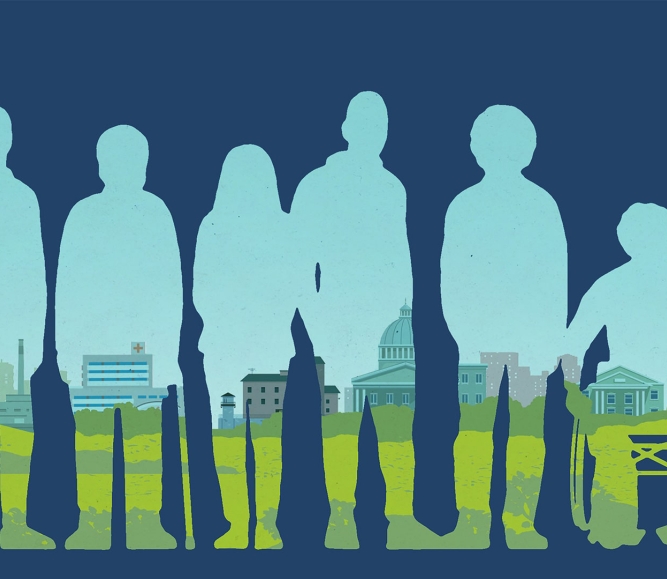Stepping Up marks five years of county innovation

As counties continue to grapple with the COVID-19 pandemic, one area that cannot be ignored is the mental health of county residents. May is national Mental Health Awareness Month and also marks the five-year anniversary of Stepping Up.
Stepping Up is a national initiative to reduce the number of people with mental illnesses in jails. Launched in May of 2015 by NACo and its partners at the Council of State Governments Justice Center and the American Psychiatric Association Foundation, more than 500 counties have passed a resolution or proclamation committing to join the initiative.
Learn More
See how counties are reducing the number of mentally ill people in jails
Right now, counties are implementing innovative strategies to promote social distancing by rapidly reducing the number of arrests and the number of people being held in their jails, many of whom have a mental illness and/or substance use disorder. As more and more people are being released from jails or being provided with citations in lieu of arrest for minor offenses, one of the challenges is making sure that these individuals are still being connected to treatment and services in the community as part of their reentry process.
Counties big and small are “stepping up” to meet this challenge and finding innovative ways to serve some of their most vulnerable residents during a time of crisis.
Shelby County, Ala.
Like many of its peers, Shelby County, Ala., has been finding opportunities to safely release people from jail to promote social distancing in its facilities during the COVID-19 pandemic. Shelby County leaders declared its mental health clinicians as essential workers, which allowed the three clinicians who are part of the Central Alabama Wellness jail treatment team to continue providing mental health assessments, treatment and services inside the jail for those who could not be released.
In addition, community-based clinicians have been leveraging flexible Medicaid telehealth rules to provide more virtual treatment and services to individuals in their homes and found that it has increased engagement even more than when clinicians could meet with clients in person. As a whole, the community has rallied to provide services to some of its most vulnerable residents.
“Stepping Up has helped solidify connections across the county to better serve people with mental illness in the time of COVID-19,” said Daphne Kendrick, Adult Mental Illness Division director at Central Alabama Wellness. “Law enforcement is using its crisis response team training to keep people from being arrested and connected to our services.”
Kendrick is hopeful that some of the changes in practice that were started because of COVID-19 will stay in place as the community starts to get back to normal.
Montgomery County, Pa.
As part of its Stepping Up efforts, Montgomery County, Pa., instituted biweekly reentry planning team meetings for justice and behavioral health partners to review cases of individuals with serious mental illness in the jail for opportunities for release and connections to treatment. When COVID-19 hit, these types of connections and releases became more urgent, and the district attorney and public offender created a process to review a broader set of cases for release based on charges as well as individuals’ treatment needs.
“Having the district attorney and public defender at the table has really enhanced our ability to not only safely release certain people from jail quickly to promote social distancing, but to identify people who would benefit from being in a community setting for treatment instead of jail,” said Pam Howard, administrator for Mental Health, Developmental Disabilities and Early Intervention at the Montgomery County Department of Health and Human Services.
A bonus of social distancing practices has been that the reentry planning team meetings turned to a virtual platform that has allowed additional community partners, social service and treatment providers, advocates and other stakeholders to join, creating a broader set of resources and coordination.
Previously, there was not enough space in the meeting rooms to include these partners in these meetings. In addition, through these meetings, the county is leveraging its mobile crisis team and community-based clinicians to regularly engage with people through telehealth and in-person meetings to maintain care plans.
Howard and her team expressed that Stepping Up helped the county to create a structure and process for addressing the needs of their most vulnerable residents so that when COVID-19 hit, the infrastructure was there to move quickly.
NACo and the national Stepping Up initiative are here to support counties struggling with COVID-19 and addressing the mental health needs of residents. For more information, visit www.NACo.org/Coronavirus or www.stepuptogether.org.
Nastassia Walsh is associate program director for community health and justice in NACo’s County Innovations Lab.
Featured Initiative
The Stepping Up Initiative
The Stepping Up Initiative is a data-driven framework that aims to reduce the overincarceration of people with mental illnesses in jails through training, resources, and support that are tailored to local needs.

Related News

House Agriculture Committee introduces 2026 Farm Bill
On February 13, House Agriculture Committee Chairman G.T. Thompson (R-Pa.-15) introduced the House version of the 2026 Farm Bill, the Farm, Food, and National Security Act of 2026.

DHS funding set to lapse, putting key county partners at risk of a partial shutdown
The U.S. Department of Homeland Security (DHS) is headed toward a funding lapse at 12:01 a.m. ET on Feb. 14 after the Senate failed this week to advance legislation to fund DHS for the remainder of Fiscal year (FY) 2026.

SBA issues new rule affecting local permitting in post-disaster rebuilding
The U.S. Small Business Administration (SBA) has issued an interim final rule that changes how rebuilding projects financed with SBA disaster loans following a Presidentially declared disaster interact with state and local permitting requirements.
